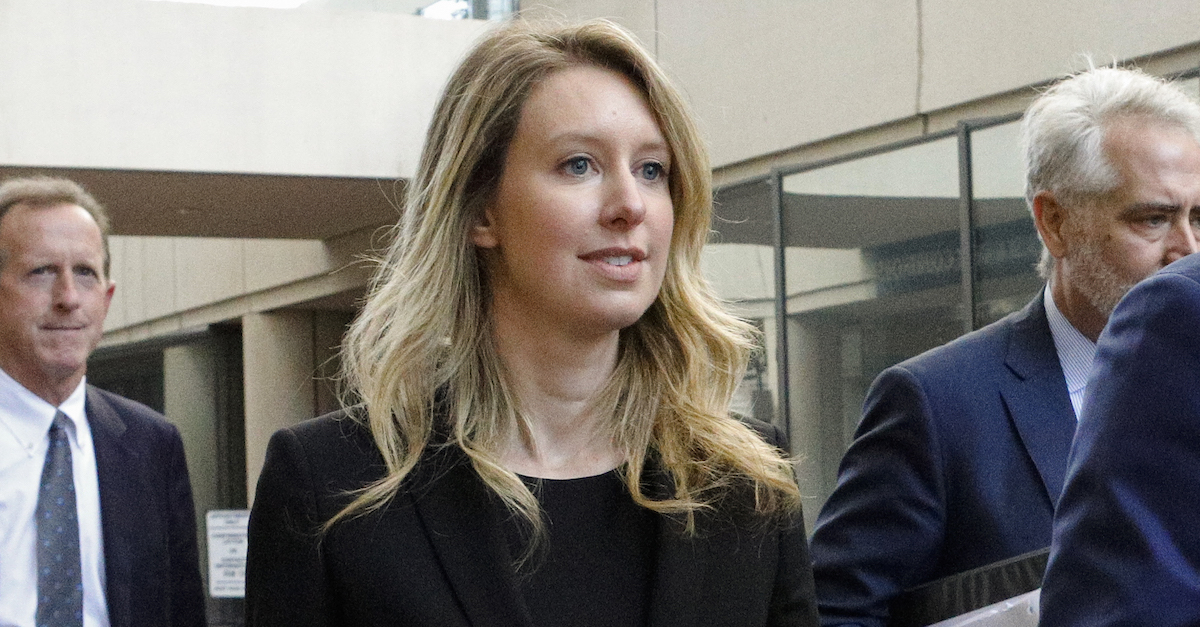
Former Theranos CEO Elizabeth Holmes leaves federal court with her legal team in July 2019 in San Jose, Calif. (Photo by Kimberly White/Getty Images)
A trial witness who surprised Theranos founder Elizabeth Holmes at her home last month says in a sworn declaration he stands by his testimony “in every respect.”
Former Theranos laboratory director Adam Rosendorff said he feels “compassion” for Holmes and Theranos co-founder Ramesh “Sunny” Balwani, “and even more so for the members of their families who were not responsible for their conduct but will be affected by any punishment they receive.”
But he also said he has “no reason to believe” prosecutors misrepresented Holmes or Balwani’s conduct at Theranos, disputing a key argument from Holmes’ lawyers as they try to persuade a judge to vacate her felony convictions and order a new trial. While the motion for new trial says Rosendorff’s Aug. 8 conversation with Holmes’ partner, William Evans, “put the integrity of the jury verdict against Ms. Holmes in grave doubt,” prosecutors said Rosendorff’s sworn statements “obviate the need to parse the drawn-from-memory collection of ambiguous, unsworn statement” recounted by Evans.
“Even if Dr. Rosendorff had actually recanted his testimony—which he did not—Defendant’s motion for a new trial would still fail under Ninth Circuit law holding that repudiated recantations do not warrant new trials,” according to a 23-page opposition, citing the Ninth Circuit Court of Appeals’ 1966 ruling in Lindsey v. United States.
Filed in U.S. District Court in San Jose, the brief is among three prosecutors wrote to oppose new trial bids by Holmes, who is scheduled to be sentenced Oct. 17 after a jury convicted her in January of three counts of wire fraud and one count of conspiracy to commit fraud. Balwani is to be sentenced Nov. 15 after a separate jury convicted him of two counts of conspiracy and ten counts of wire fraud.
Prosecutors on Wednesday also opposed to Holmes’ second motion for new trial, which cites arguments prosecutors made in Balwani’s trial about the power dynamics of his relationship with Holmes that her lawyers say differ greatly from what was presented in her trial. A third motion opposed Wednesday cites emails prosecutors produced after trial that relate to their failed attempts to access a database concerning Thernaos’ testing and quality control.
But it’s the motion concerning Rosendorff that best matches the Hollywood-style intrigue that’s cloaked Holmes since she was a media darling pitching Theranos as a wonder company that would revolutionize bioscience through its unrivaled blood-testing capabilities, raising millions from investors in the process.
A key prosecution witness, Rosendorff was on the stand for six days in Holmes’ trial, four of them devoted to cross-examination by Holmes’ lawyers. He was a clinical lab director at Theranos from mid-2013 through late-2014, when he decided to leave “due to the troubling things he witnessed there,” prosecutors wrote in Wednesday’s opposition. Rosendorff testified that he felt his integrity was at stake after observing Theranos’ technology producing questionable results, describing for jurors how he started forwarding to his personal account company emails he viewed as incriminating. He testified similarly in Balwani’s trial last April.
But on Aug. 8, Rosendorff appeared at Holmes’ home, asking to see her because it would be “healing for both himself and Elizabeth to talk,” according to a sworn declaration from Evans that Holmes’ lawyers submitted with their motion, which asks for a new trial or at least an evidentiary hearing that further explore Rosendorff’s testimony. According to Evans, Rosendorff said prosecutors “made things sounds worse than they were” when people at Theranos were “just doing the best they could” and “working so hard to do something good and meaningful.” Holmes was at the residence at the time, but Evans said he told Rosendorff he couldn’t speak to her and that he needed to leave.
Rosendorff doesn’t mention the driveway encounter with Evans in his declaration or any of his alleged statements to Evans, but prosecutors don’t deny he visited the home. They do, however, question Evans’ account of the conversation by pointing out that “there seems to be no recording or transcript of that conversation” and asking the court not to treat Evans account “as equivalent to a sworn affidavit from Dr. Rosendorff himself.”
“If Dr. Rosendorff had unambiguously recanted his testimony, his recent sworn statements would cancel out the effect of that recantation,” according to the brief from assistant U.S. attorneys John C. Bostic, Robert S. Leach, Kelly I. Volkar and Jeffrey B. Schenk in the Northern District of California.
In his declaration, Rosendorff said he “answered every question put to me completely, accurately, and truthfully to the best of my ability.”
“Nothing I have learned since giving my testimony has changed my recollection of the events I witnessed during my time at Theranos,” according to the declaration. “I stand by my testimony at Ms. Holmes’ and Mr. Balwani’s trials in every respect.”
He added: “The only instruction the government has given me in connection with this case is to tell the truth about the events I witnessed.”
Prosecutors began their accompanying brief by saying the defense “has always had trouble making up its mind about Dr. Adam Rosendorff” before recounting various trial arguments.
“Now, months after Defendant’s conviction, the defense has assigned Dr. Rosendorff a new role: Defendant’s ticket to a new trial,” they wrote. “Really, though, Dr. Rosendorff is none of these things.”
U.S. District Judge Edward J. Davila is to consider new trial motions at a hearing Oct. 3 in San Jose.
[Image via Kimberly White/Getty Images]